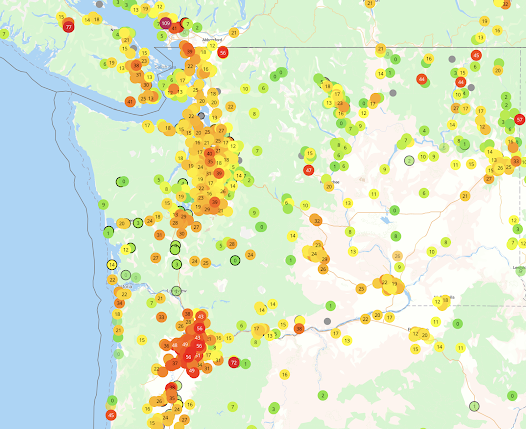There have been a lot of stories about heatwave deaths this summer and the latest Washington State Department of Health (DOH) statistics indicate that the June 2021 heatwave contributed to 91 deaths.
The DOH also noted that 39 individuals died from heat-related complications from 2015-2020. Nearly all of those who lost their lives were either elderly or suffered from serious pre-existing conditions.
Heatwave deaths are all tragic losses and we should do all we can to prevent them, including expanded use of air conditioning, cooling centers, and more.
But it is also important to understand the other "side of the coin", about deaths resulting from cold waves, both in the Northwest and the rest of the nation.
And the facts may surprise you. Far more people die from cold than heat.
Furthermore, cold waves sometimes kill young people, often on icy roads.
Consider the national statistics provided by the U.S. Environmental Prediction Agency. Based on hospital records, the death rate of coldwaves (top) is at least TWICE that of heatwaves (bottom)
Coldwaves
Heatwaves
A 2014 study by the U.S. Department of Health and Human Services found that from 2006–2010 about 2,000 U.S. residents died each year from weather-related causes About 31% of these deaths were attributed to exposure to excessive natural heat, heatstroke, sunstroke, or all; 63% were attributed to exposure to excessive natural cold, hypothermia, or both.
Cold was twice the threat of heat, consistent with the findings of the EPA.
And an article in the well-known medical journal, The Lancet (Gasparinni et al. 2015), took a more international perspective examining data from 384 locations in Australia, Brazil, Canada, China, Italy, Japan, South Korea, Spain, Sweden, Taiwan, Thailand, UK, and the U.S. found that cold was MUCH more of threat....by a ratio of roughly 15 to 1.
Imagine courtesy of the Lance.
I could provide more publications, but the message is clear and consistent:
Coldwaves kill many more people than heatwaves.
The recent Texas cold wave provides a stark example, with at least 210 losing their lives. And here in Washington exposure under cold conditions frequently kill the homeless and even folks inside unheated homes. I found several dozen of such deaths in the Northwest media during the past ten years alone. And there is a proven relationship of cold contributing to cardiac deaths in our area (see here for one study)
It is clear that the threat of cold is vastly underplayed by these statistics. Cold waves are associated with icy roadways and ice on roads is a major cause of accidents, particularly in our state.
A few years ago I checked the WA State Patrol database, finding that one to two dozen WA citizens lost their lives each year through accidents on icy roads, with hundreds being injured. Washington DOT statistics were consistent with this.
As a young professor, I started doing forensic meteorology research, and the number one reason lawyers called me was to aid in cases with deaths on icy roads. And for those interested in social justice issues, such icy deaths fell predominantly on more vulnerable groups, who often traveled in the early morning hours to agricultural, construction, or service jobs.
Icy road accidents, often associated with western WA snow events, often hurt the young and healthy.
Global Warming Implications
Now let me say something that is true, but unfortunately will get some folks upset.
Since cold waves kill more people than heatwaves, global warming might well cause fewer deaths overall. Ok, I said it. And it is true, unfortunately, that the media, such as the Seattle Times and National Public Radio (e.g., KNKX) never mention this fact. Heatwaves are discussed endlessly, but the harm of cold waves is ignored. And you know why.
This is NOT to say we should ignore global warming because warming might save lives and lessen injury. We should take prudent and economically reasonable steps to minimize warming because of other issues. That is why I support a carbon tax, nuclear power, and the realistic use of renewables. And we need to ensure we talk prudent adaptation steps.
But let us at least acknowledge the truth of temperature extremes and human harm.
______________________________________________
The Second Edition of My Northwest Weather Book is Now Available!
Finally, the supply chain issues have been overcome. My new book is immensely improved over the first edition, with new chapters on the meteorology of Northwest wildfires and the weather of British Columbia. A completely revamped chapter on the effects of global warming on our region. And it has been brought up to date with recent weather events and the imagery is improved greatly.
Where can you get it?
And yes, there are online sellers like Amazon, which I understand ordered over 2000 copies.












Comments
Post a Comment